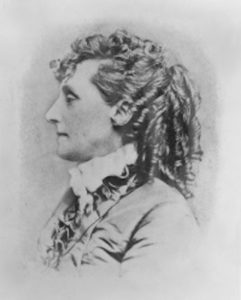
Elizabeth Van Lew
*Elizabeth Van Lew was born on this date in 1818. She was a white-American abolitionist and philanthropist.
Elizabeth Van Lew was born in Richmond, Virginia, to John Van Lew and Eliza Baker, whose maternal grandfather was abolitionist Hilary Baker, mayor of Philadelphia from 1796 to 1798. Her father came to Richmond in 1806 at 16; within 20 years, he had built up a prosperous hardware business and owned several slaves. Her family sent Van Lew to Philadelphia for her education at a Quaker school, reinforcing her abolitionist sentiments. When her father died in 1843, Van Lew and her mother freed the family's slaves. Many emancipated slaves continued as paid servants with the family, including the young future Union spy Mary Bowser.
In the depths of the 1837–44 depression, Elizabeth used her entire cash inheritance of $10,000 (equivalent to $256,100 in 2019) to purchase and free some of their former slaves' relatives. For years thereafter, Elizabeth's brother was a regular visitor to Richmond's slave market, where, when a family was about to be split up, he would purchase them all, bring them home, and issue papers of manumission. During the American Civil War, Van Lew began working with her mother on behalf of the Union, caring for wounded soldiers.
When Libby Prison was opened in Richmond, Van Lew was allowed to bring food, clothing, writing paper, and other things to the Union soldiers imprisoned there. She aided prisoners in escape attempts, passing them information about safe houses and getting a Union sympathizer appointed to the prison staff. Recently captured prisoners gave Van Lew information on Confederate troop levels and movements, which she could pass on to Union commanders. She even helped hide escaped Union prisoners and Confederate deserters in her mansion.
Van Lew also operated a spy ring called "Richmond Underground" during the war, which included clerks in the War and Navy Departments of the Confederacy and a Richmond mayoral candidate. Her spy network was so efficient that on several occasions, she sent Lt. Gen. Ulysses S Grant fresh flowers from her garden and a copy of the Richmond newspaper. She developed a cipher system and often smuggled messages out of Richmond in hollow eggs. When Richmond fell to U.S. forces in April 1865, Van Lew was the first to raise the United States flag in the city.
On Grant's first visit to Richmond after the war, he had tea with Van Lew and appointed her Postmaster General for the next eight years because of the merit of her work. Van Lew modernized the city's postal system and employed several Blacks until new President Rutherford B. Hayes replaced her in 1877. She was allowed to return as a postal clerk in Richmond, where she served from 1883 to 1887.
After the Reconstruction, Van Lew became increasingly ostracized in Richmond. "No one will walk with us on the street," she wrote, "no one will go with us anywhere, and it grows worse and worse as the years roll on." She reportedly persuaded the United States Department of War to give her all of her records so that she could hide the true extent of her espionage from her neighbors. Having spent her family's fortune on intelligence activities during the war, she tried in vain to be reimbursed by the federal government. When attempts to secure a government pension also failed, the elderly spinster turned to the family and friends of Union Col. Paul Joseph Revere, whom she had helped at the Henrico County Jail in 1862. These Bostonians collected money for the woman who helped so many Union soldiers during the war.
Elizabeth Van Lew died on September 25, 1900 (aged 81), and was buried in Richmond's Shockoe Hill Cemetery. She was purportedly buried vertically, facing the north, and relatives of Union Colonel Paul J. Revere, whom she had aided during the war, donated the tombstone. However, many Southerners regarded Van Lew as a traitor even into the twentieth century. In her will, Van Lew bequeathed her manuscripts, including her account of the war, to John P. Reynolds, Col. Revere's nephew. In 1911, Reynolds convinced the scholar William G. Beymer to publish the first biography of Van Lew in Harper's Monthly. The biography indicated that Van Lew had been so successful in spying activities because she had feigned lunacy, and this idea won Van Lew the nickname "Crazy Bet."
However, it is unlikely that Van Lew did pretend to be crazy. Instead, she probably would have relied on the Victorian custom of female charity to cover her espionage. The city of Richmond acquired and demolished the Van Lew mansion, her former home, in 1911. Bellevue Elementary School (which remains) was erected on the site the following year. Historical plaques and a marker now memorialize her activities and those of Bowser. Furthermore, the daughter of two of Van Lew's servants, Maggie Walker, became a prominent Christian entrepreneur in Richmond, founding the country's first Black woman to own a bank. Elizabeth Van Lew was inducted into the Military Intelligence Hall of Fame in 1993.